Analysis of Contemporary Financial Accounting Issues in Australia
VerifiedAdded on 2022/09/14
|9
|2140
|18
Report
AI Summary
This report examines contemporary financial accounting issues in Australia, particularly focusing on the adoption of International Financial Reporting Standards (IFRS). It analyzes the impact of IFRS on various entities, including small and medium enterprises (SMEs), and the role of the International Accounting Standards Board (IASB). The report discusses the challenges and successes of IFRS implementation in the Pacific Rim region, including Australia and New Zealand, and the debates surrounding its adoption. It highlights the changes in financial reporting behavior and the influence of IFRS on investor decisions. The report also explores the capitalization of intangibles and the qualitative characteristics of accounting standards, emphasizing the global impact of IFRS and its implications for financial reporting and economic development. The report also mentions the adoption of the IFRS by the USA and the issues resolved under the planning of the SEC, which are thinking about the benefits of the investors, appropriate application and development of the IFRS for the US Domestic Reporting System, understanding the investors and education related to the IFRS.
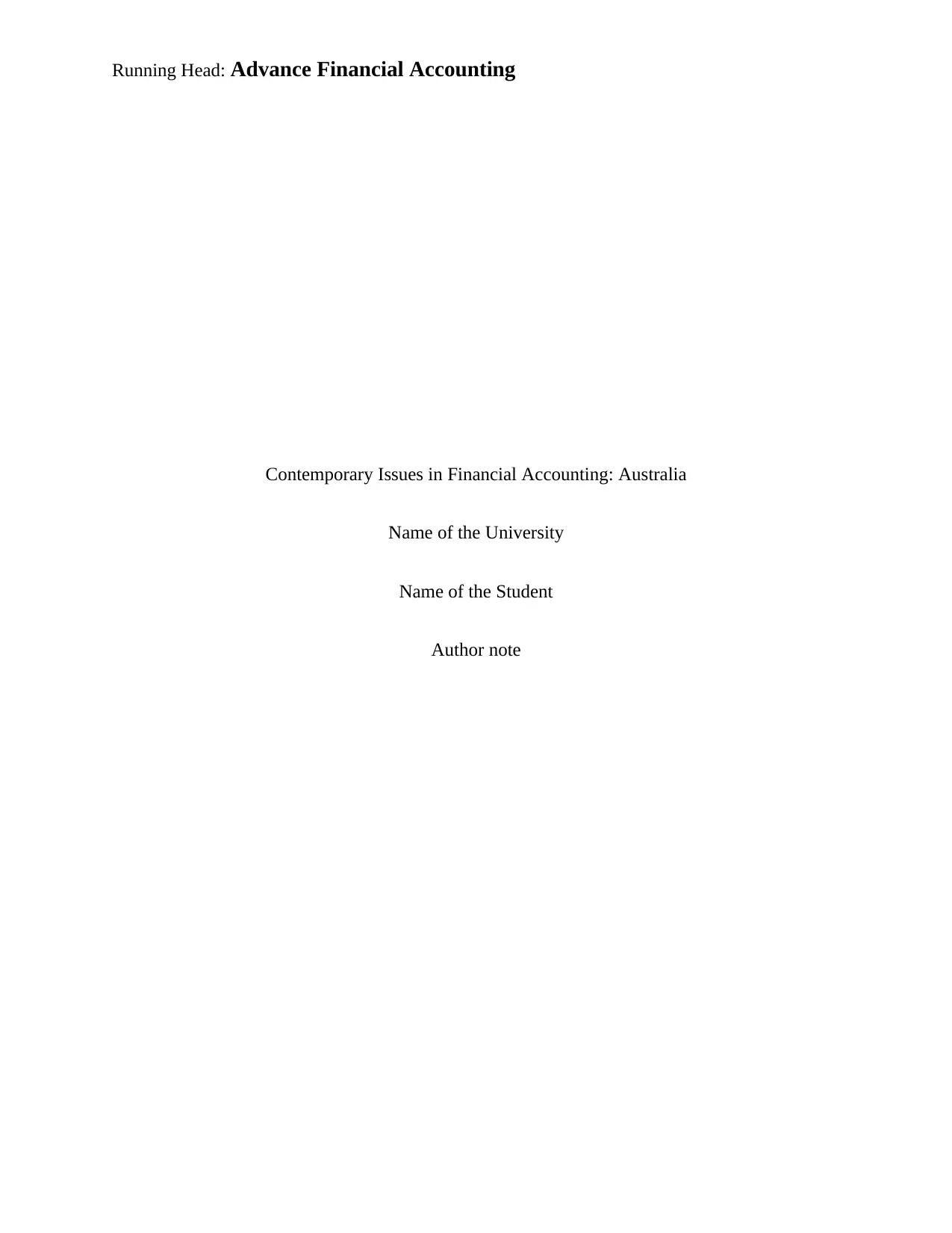
Running Head: Advance Financial Accounting
Contemporary Issues in Financial Accounting: Australia
Name of the University
Name of the Student
Author note
Contemporary Issues in Financial Accounting: Australia
Name of the University
Name of the Student
Author note
Paraphrase This Document
Need a fresh take? Get an instant paraphrase of this document with our AI Paraphraser
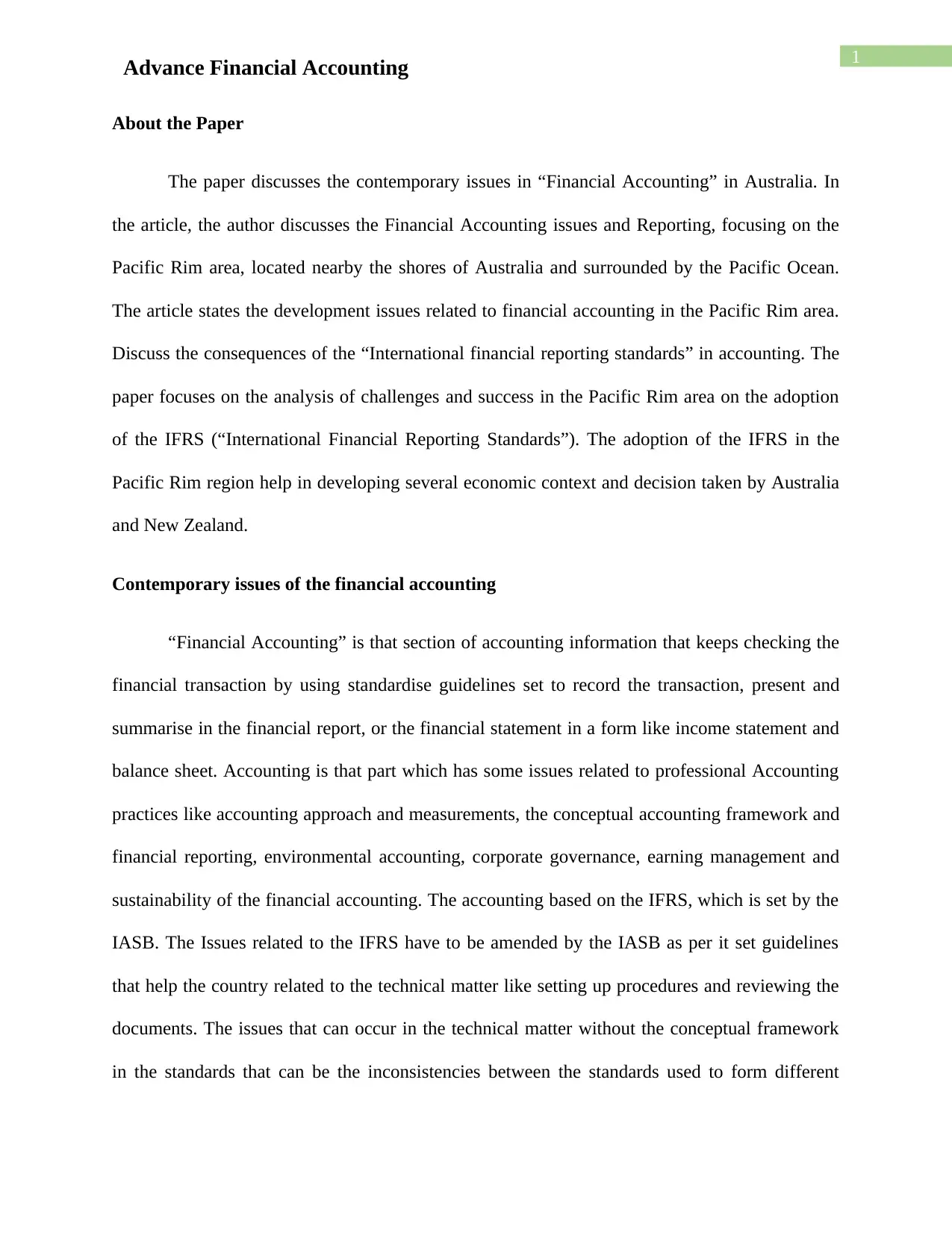
1
Advance Financial Accounting
About the Paper
The paper discusses the contemporary issues in “Financial Accounting” in Australia. In
the article, the author discusses the Financial Accounting issues and Reporting, focusing on the
Pacific Rim area, located nearby the shores of Australia and surrounded by the Pacific Ocean.
The article states the development issues related to financial accounting in the Pacific Rim area.
Discuss the consequences of the “International financial reporting standards” in accounting. The
paper focuses on the analysis of challenges and success in the Pacific Rim area on the adoption
of the IFRS (“International Financial Reporting Standards”). The adoption of the IFRS in the
Pacific Rim region help in developing several economic context and decision taken by Australia
and New Zealand.
Contemporary issues of the financial accounting
“Financial Accounting” is that section of accounting information that keeps checking the
financial transaction by using standardise guidelines set to record the transaction, present and
summarise in the financial report, or the financial statement in a form like income statement and
balance sheet. Accounting is that part which has some issues related to professional Accounting
practices like accounting approach and measurements, the conceptual accounting framework and
financial reporting, environmental accounting, corporate governance, earning management and
sustainability of the financial accounting. The accounting based on the IFRS, which is set by the
IASB. The Issues related to the IFRS have to be amended by the IASB as per it set guidelines
that help the country related to the technical matter like setting up procedures and reviewing the
documents. The issues that can occur in the technical matter without the conceptual framework
in the standards that can be the inconsistencies between the standards used to form different
Advance Financial Accounting
About the Paper
The paper discusses the contemporary issues in “Financial Accounting” in Australia. In
the article, the author discusses the Financial Accounting issues and Reporting, focusing on the
Pacific Rim area, located nearby the shores of Australia and surrounded by the Pacific Ocean.
The article states the development issues related to financial accounting in the Pacific Rim area.
Discuss the consequences of the “International financial reporting standards” in accounting. The
paper focuses on the analysis of challenges and success in the Pacific Rim area on the adoption
of the IFRS (“International Financial Reporting Standards”). The adoption of the IFRS in the
Pacific Rim region help in developing several economic context and decision taken by Australia
and New Zealand.
Contemporary issues of the financial accounting
“Financial Accounting” is that section of accounting information that keeps checking the
financial transaction by using standardise guidelines set to record the transaction, present and
summarise in the financial report, or the financial statement in a form like income statement and
balance sheet. Accounting is that part which has some issues related to professional Accounting
practices like accounting approach and measurements, the conceptual accounting framework and
financial reporting, environmental accounting, corporate governance, earning management and
sustainability of the financial accounting. The accounting based on the IFRS, which is set by the
IASB. The Issues related to the IFRS have to be amended by the IASB as per it set guidelines
that help the country related to the technical matter like setting up procedures and reviewing the
documents. The issues that can occur in the technical matter without the conceptual framework
in the standards that can be the inconsistencies between the standards used to form different
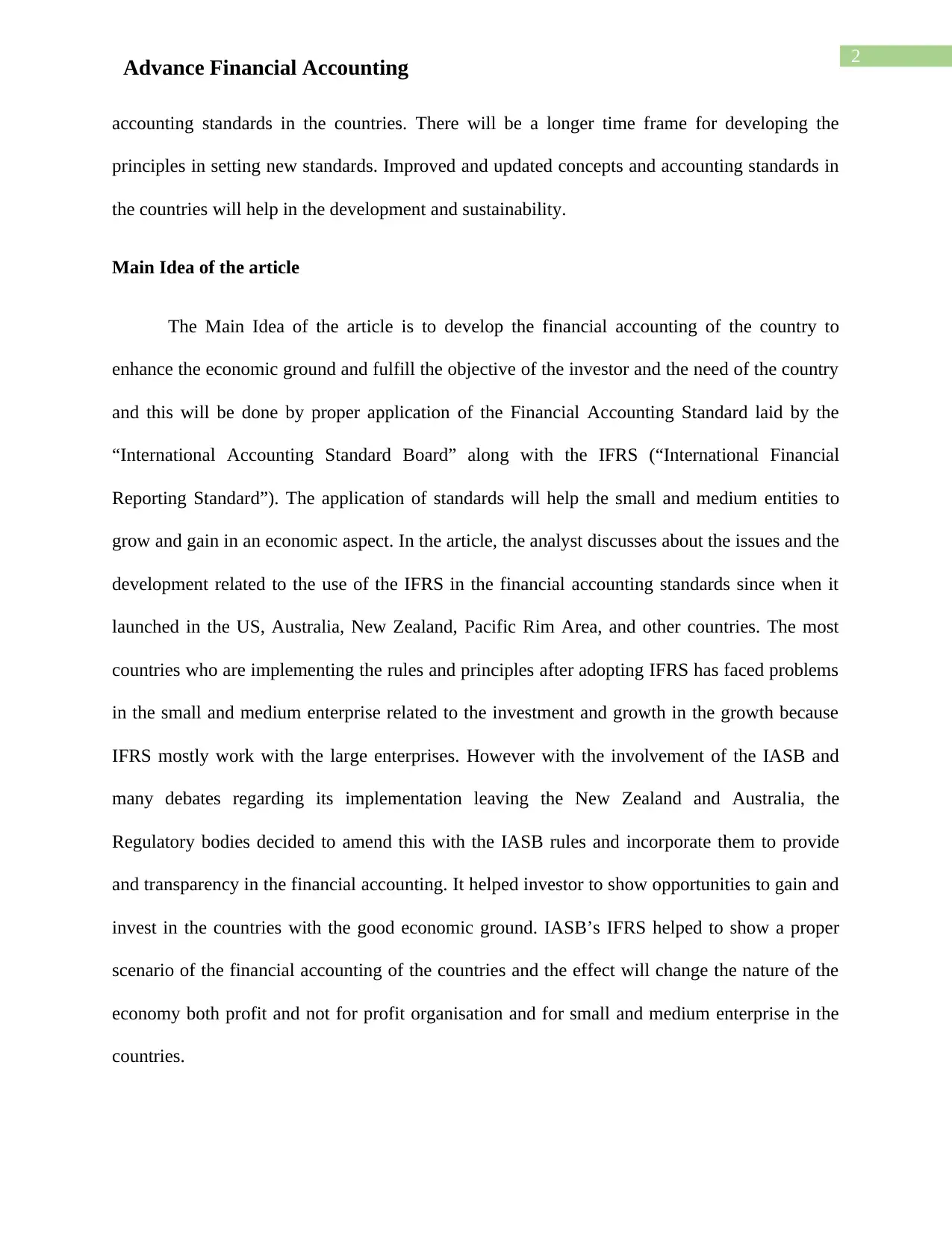
2
Advance Financial Accounting
accounting standards in the countries. There will be a longer time frame for developing the
principles in setting new standards. Improved and updated concepts and accounting standards in
the countries will help in the development and sustainability.
Main Idea of the article
The Main Idea of the article is to develop the financial accounting of the country to
enhance the economic ground and fulfill the objective of the investor and the need of the country
and this will be done by proper application of the Financial Accounting Standard laid by the
“International Accounting Standard Board” along with the IFRS (“International Financial
Reporting Standard”). The application of standards will help the small and medium entities to
grow and gain in an economic aspect. In the article, the analyst discusses about the issues and the
development related to the use of the IFRS in the financial accounting standards since when it
launched in the US, Australia, New Zealand, Pacific Rim Area, and other countries. The most
countries who are implementing the rules and principles after adopting IFRS has faced problems
in the small and medium enterprise related to the investment and growth in the growth because
IFRS mostly work with the large enterprises. However with the involvement of the IASB and
many debates regarding its implementation leaving the New Zealand and Australia, the
Regulatory bodies decided to amend this with the IASB rules and incorporate them to provide
and transparency in the financial accounting. It helped investor to show opportunities to gain and
invest in the countries with the good economic ground. IASB’s IFRS helped to show a proper
scenario of the financial accounting of the countries and the effect will change the nature of the
economy both profit and not for profit organisation and for small and medium enterprise in the
countries.
Advance Financial Accounting
accounting standards in the countries. There will be a longer time frame for developing the
principles in setting new standards. Improved and updated concepts and accounting standards in
the countries will help in the development and sustainability.
Main Idea of the article
The Main Idea of the article is to develop the financial accounting of the country to
enhance the economic ground and fulfill the objective of the investor and the need of the country
and this will be done by proper application of the Financial Accounting Standard laid by the
“International Accounting Standard Board” along with the IFRS (“International Financial
Reporting Standard”). The application of standards will help the small and medium entities to
grow and gain in an economic aspect. In the article, the analyst discusses about the issues and the
development related to the use of the IFRS in the financial accounting standards since when it
launched in the US, Australia, New Zealand, Pacific Rim Area, and other countries. The most
countries who are implementing the rules and principles after adopting IFRS has faced problems
in the small and medium enterprise related to the investment and growth in the growth because
IFRS mostly work with the large enterprises. However with the involvement of the IASB and
many debates regarding its implementation leaving the New Zealand and Australia, the
Regulatory bodies decided to amend this with the IASB rules and incorporate them to provide
and transparency in the financial accounting. It helped investor to show opportunities to gain and
invest in the countries with the good economic ground. IASB’s IFRS helped to show a proper
scenario of the financial accounting of the countries and the effect will change the nature of the
economy both profit and not for profit organisation and for small and medium enterprise in the
countries.
⊘ This is a preview!⊘
Do you want full access?
Subscribe today to unlock all pages.

Trusted by 1+ million students worldwide
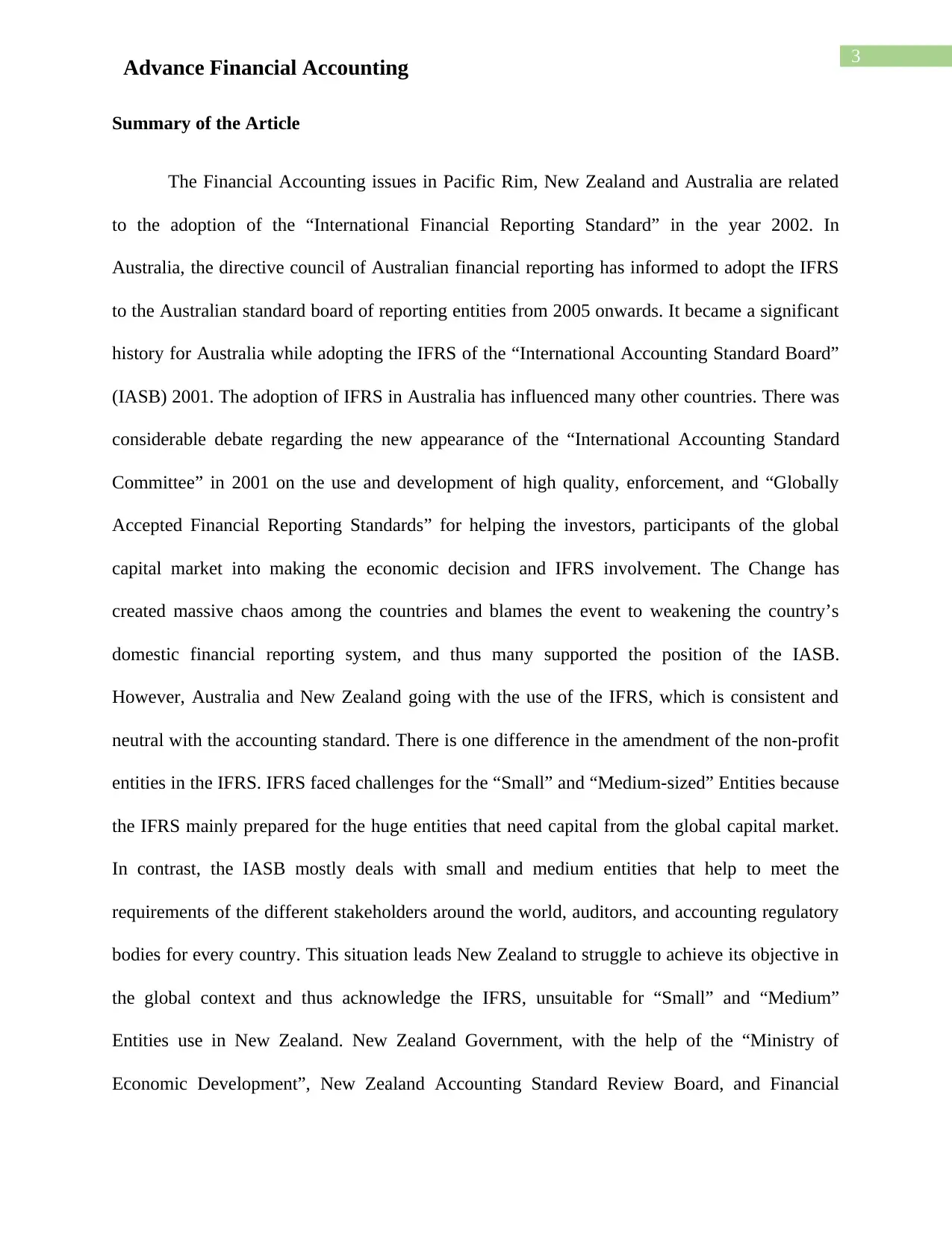
3
Advance Financial Accounting
Summary of the Article
The Financial Accounting issues in Pacific Rim, New Zealand and Australia are related
to the adoption of the “International Financial Reporting Standard” in the year 2002. In
Australia, the directive council of Australian financial reporting has informed to adopt the IFRS
to the Australian standard board of reporting entities from 2005 onwards. It became a significant
history for Australia while adopting the IFRS of the “International Accounting Standard Board”
(IASB) 2001. The adoption of IFRS in Australia has influenced many other countries. There was
considerable debate regarding the new appearance of the “International Accounting Standard
Committee” in 2001 on the use and development of high quality, enforcement, and “Globally
Accepted Financial Reporting Standards” for helping the investors, participants of the global
capital market into making the economic decision and IFRS involvement. The Change has
created massive chaos among the countries and blames the event to weakening the country’s
domestic financial reporting system, and thus many supported the position of the IASB.
However, Australia and New Zealand going with the use of the IFRS, which is consistent and
neutral with the accounting standard. There is one difference in the amendment of the non-profit
entities in the IFRS. IFRS faced challenges for the “Small” and “Medium-sized” Entities because
the IFRS mainly prepared for the huge entities that need capital from the global capital market.
In contrast, the IASB mostly deals with small and medium entities that help to meet the
requirements of the different stakeholders around the world, auditors, and accounting regulatory
bodies for every country. This situation leads New Zealand to struggle to achieve its objective in
the global context and thus acknowledge the IFRS, unsuitable for “Small” and “Medium”
Entities use in New Zealand. New Zealand Government, with the help of the “Ministry of
Economic Development”, New Zealand Accounting Standard Review Board, and Financial
Advance Financial Accounting
Summary of the Article
The Financial Accounting issues in Pacific Rim, New Zealand and Australia are related
to the adoption of the “International Financial Reporting Standard” in the year 2002. In
Australia, the directive council of Australian financial reporting has informed to adopt the IFRS
to the Australian standard board of reporting entities from 2005 onwards. It became a significant
history for Australia while adopting the IFRS of the “International Accounting Standard Board”
(IASB) 2001. The adoption of IFRS in Australia has influenced many other countries. There was
considerable debate regarding the new appearance of the “International Accounting Standard
Committee” in 2001 on the use and development of high quality, enforcement, and “Globally
Accepted Financial Reporting Standards” for helping the investors, participants of the global
capital market into making the economic decision and IFRS involvement. The Change has
created massive chaos among the countries and blames the event to weakening the country’s
domestic financial reporting system, and thus many supported the position of the IASB.
However, Australia and New Zealand going with the use of the IFRS, which is consistent and
neutral with the accounting standard. There is one difference in the amendment of the non-profit
entities in the IFRS. IFRS faced challenges for the “Small” and “Medium-sized” Entities because
the IFRS mainly prepared for the huge entities that need capital from the global capital market.
In contrast, the IASB mostly deals with small and medium entities that help to meet the
requirements of the different stakeholders around the world, auditors, and accounting regulatory
bodies for every country. This situation leads New Zealand to struggle to achieve its objective in
the global context and thus acknowledge the IFRS, unsuitable for “Small” and “Medium”
Entities use in New Zealand. New Zealand Government, with the help of the “Ministry of
Economic Development”, New Zealand Accounting Standard Review Board, and Financial
Paraphrase This Document
Need a fresh take? Get an instant paraphrase of this document with our AI Paraphraser
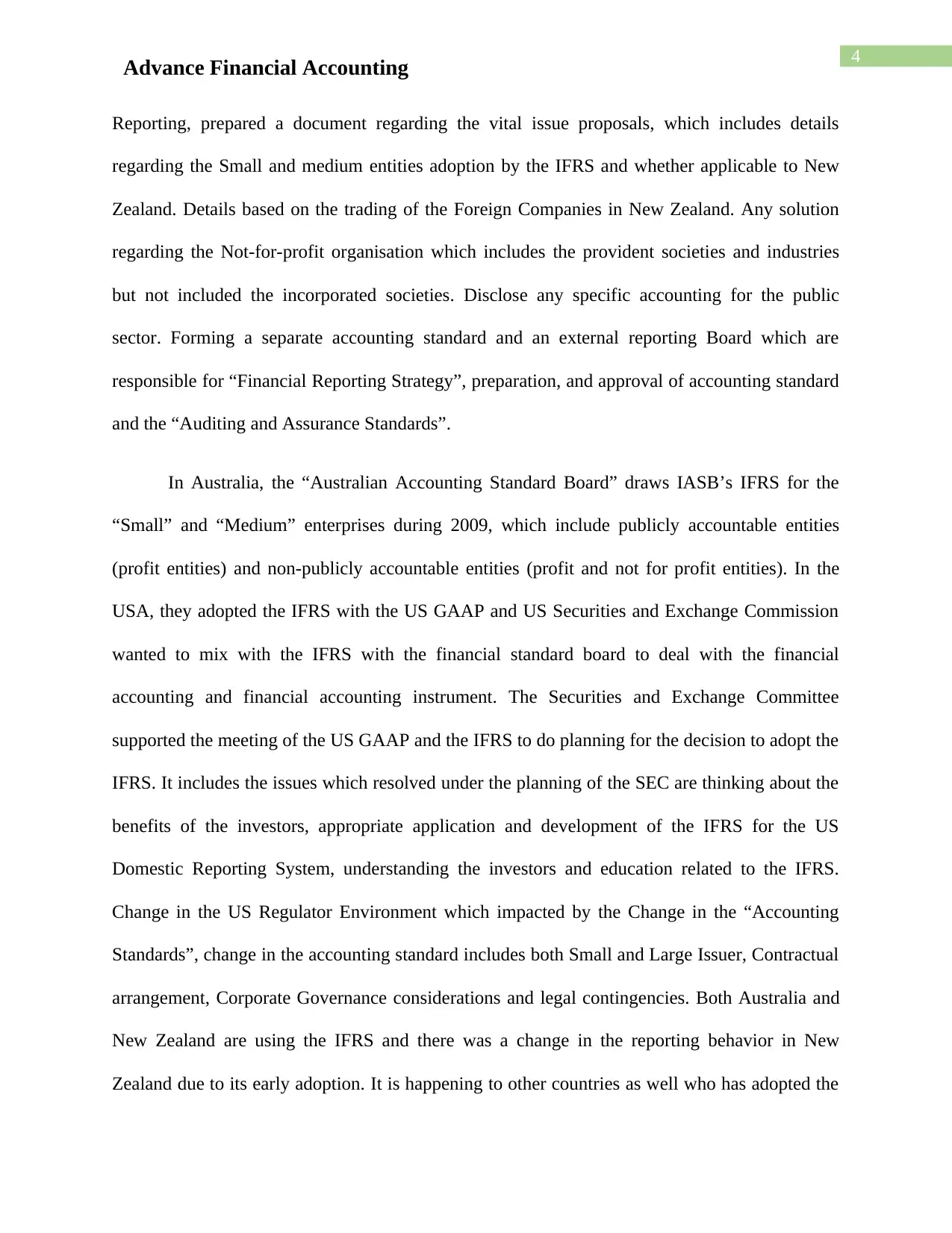
4
Advance Financial Accounting
Reporting, prepared a document regarding the vital issue proposals, which includes details
regarding the Small and medium entities adoption by the IFRS and whether applicable to New
Zealand. Details based on the trading of the Foreign Companies in New Zealand. Any solution
regarding the Not-for-profit organisation which includes the provident societies and industries
but not included the incorporated societies. Disclose any specific accounting for the public
sector. Forming a separate accounting standard and an external reporting Board which are
responsible for “Financial Reporting Strategy”, preparation, and approval of accounting standard
and the “Auditing and Assurance Standards”.
In Australia, the “Australian Accounting Standard Board” draws IASB’s IFRS for the
“Small” and “Medium” enterprises during 2009, which include publicly accountable entities
(profit entities) and non-publicly accountable entities (profit and not for profit entities). In the
USA, they adopted the IFRS with the US GAAP and US Securities and Exchange Commission
wanted to mix with the IFRS with the financial standard board to deal with the financial
accounting and financial accounting instrument. The Securities and Exchange Committee
supported the meeting of the US GAAP and the IFRS to do planning for the decision to adopt the
IFRS. It includes the issues which resolved under the planning of the SEC are thinking about the
benefits of the investors, appropriate application and development of the IFRS for the US
Domestic Reporting System, understanding the investors and education related to the IFRS.
Change in the US Regulator Environment which impacted by the Change in the “Accounting
Standards”, change in the accounting standard includes both Small and Large Issuer, Contractual
arrangement, Corporate Governance considerations and legal contingencies. Both Australia and
New Zealand are using the IFRS and there was a change in the reporting behavior in New
Zealand due to its early adoption. It is happening to other countries as well who has adopted the
Advance Financial Accounting
Reporting, prepared a document regarding the vital issue proposals, which includes details
regarding the Small and medium entities adoption by the IFRS and whether applicable to New
Zealand. Details based on the trading of the Foreign Companies in New Zealand. Any solution
regarding the Not-for-profit organisation which includes the provident societies and industries
but not included the incorporated societies. Disclose any specific accounting for the public
sector. Forming a separate accounting standard and an external reporting Board which are
responsible for “Financial Reporting Strategy”, preparation, and approval of accounting standard
and the “Auditing and Assurance Standards”.
In Australia, the “Australian Accounting Standard Board” draws IASB’s IFRS for the
“Small” and “Medium” enterprises during 2009, which include publicly accountable entities
(profit entities) and non-publicly accountable entities (profit and not for profit entities). In the
USA, they adopted the IFRS with the US GAAP and US Securities and Exchange Commission
wanted to mix with the IFRS with the financial standard board to deal with the financial
accounting and financial accounting instrument. The Securities and Exchange Committee
supported the meeting of the US GAAP and the IFRS to do planning for the decision to adopt the
IFRS. It includes the issues which resolved under the planning of the SEC are thinking about the
benefits of the investors, appropriate application and development of the IFRS for the US
Domestic Reporting System, understanding the investors and education related to the IFRS.
Change in the US Regulator Environment which impacted by the Change in the “Accounting
Standards”, change in the accounting standard includes both Small and Large Issuer, Contractual
arrangement, Corporate Governance considerations and legal contingencies. Both Australia and
New Zealand are using the IFRS and there was a change in the reporting behavior in New
Zealand due to its early adoption. It is happening to other countries as well who has adopted the
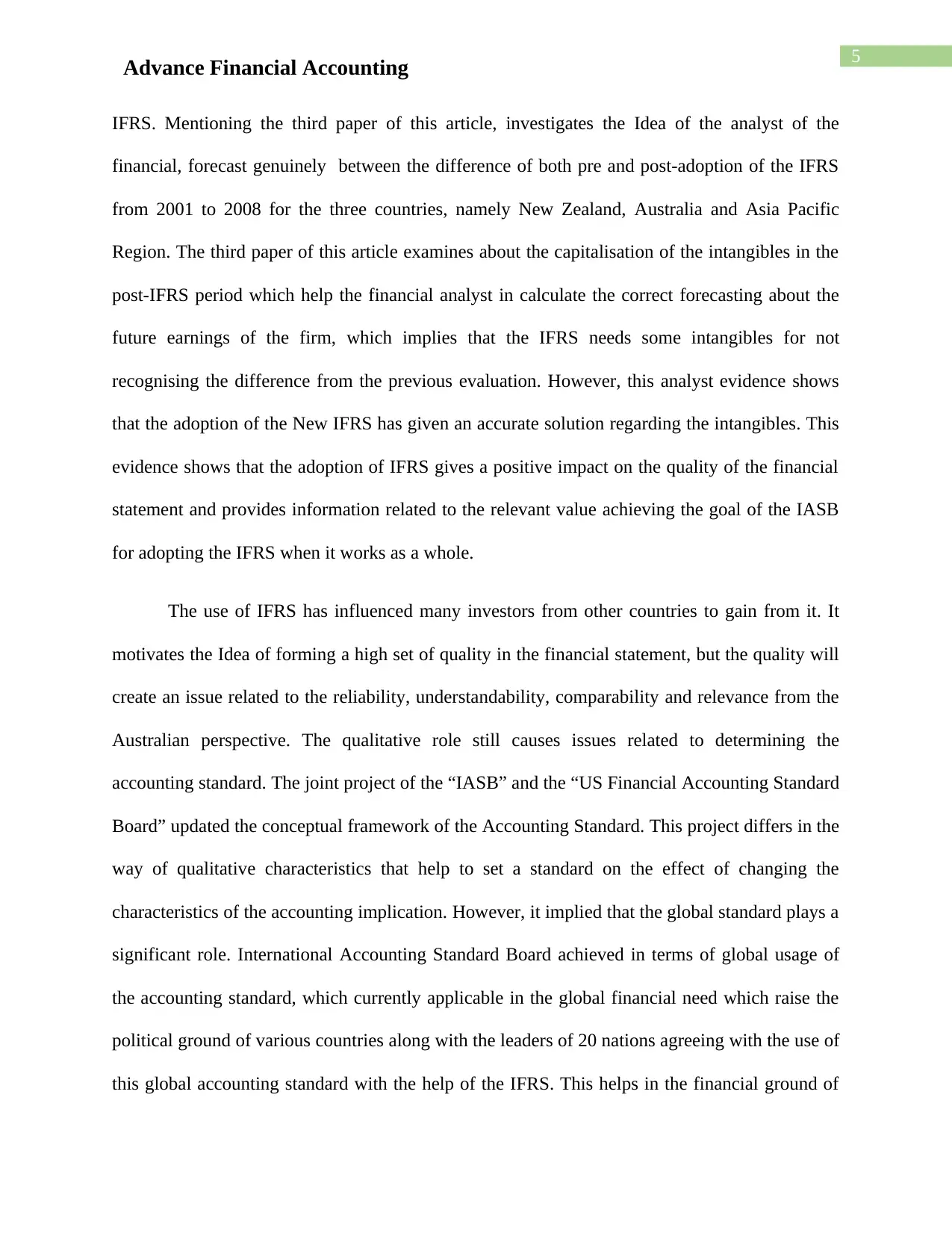
5
Advance Financial Accounting
IFRS. Mentioning the third paper of this article, investigates the Idea of the analyst of the
financial, forecast genuinely between the difference of both pre and post-adoption of the IFRS
from 2001 to 2008 for the three countries, namely New Zealand, Australia and Asia Pacific
Region. The third paper of this article examines about the capitalisation of the intangibles in the
post-IFRS period which help the financial analyst in calculate the correct forecasting about the
future earnings of the firm, which implies that the IFRS needs some intangibles for not
recognising the difference from the previous evaluation. However, this analyst evidence shows
that the adoption of the New IFRS has given an accurate solution regarding the intangibles. This
evidence shows that the adoption of IFRS gives a positive impact on the quality of the financial
statement and provides information related to the relevant value achieving the goal of the IASB
for adopting the IFRS when it works as a whole.
The use of IFRS has influenced many investors from other countries to gain from it. It
motivates the Idea of forming a high set of quality in the financial statement, but the quality will
create an issue related to the reliability, understandability, comparability and relevance from the
Australian perspective. The qualitative role still causes issues related to determining the
accounting standard. The joint project of the “IASB” and the “US Financial Accounting Standard
Board” updated the conceptual framework of the Accounting Standard. This project differs in the
way of qualitative characteristics that help to set a standard on the effect of changing the
characteristics of the accounting implication. However, it implied that the global standard plays a
significant role. International Accounting Standard Board achieved in terms of global usage of
the accounting standard, which currently applicable in the global financial need which raise the
political ground of various countries along with the leaders of 20 nations agreeing with the use of
this global accounting standard with the help of the IFRS. This helps in the financial ground of
Advance Financial Accounting
IFRS. Mentioning the third paper of this article, investigates the Idea of the analyst of the
financial, forecast genuinely between the difference of both pre and post-adoption of the IFRS
from 2001 to 2008 for the three countries, namely New Zealand, Australia and Asia Pacific
Region. The third paper of this article examines about the capitalisation of the intangibles in the
post-IFRS period which help the financial analyst in calculate the correct forecasting about the
future earnings of the firm, which implies that the IFRS needs some intangibles for not
recognising the difference from the previous evaluation. However, this analyst evidence shows
that the adoption of the New IFRS has given an accurate solution regarding the intangibles. This
evidence shows that the adoption of IFRS gives a positive impact on the quality of the financial
statement and provides information related to the relevant value achieving the goal of the IASB
for adopting the IFRS when it works as a whole.
The use of IFRS has influenced many investors from other countries to gain from it. It
motivates the Idea of forming a high set of quality in the financial statement, but the quality will
create an issue related to the reliability, understandability, comparability and relevance from the
Australian perspective. The qualitative role still causes issues related to determining the
accounting standard. The joint project of the “IASB” and the “US Financial Accounting Standard
Board” updated the conceptual framework of the Accounting Standard. This project differs in the
way of qualitative characteristics that help to set a standard on the effect of changing the
characteristics of the accounting implication. However, it implied that the global standard plays a
significant role. International Accounting Standard Board achieved in terms of global usage of
the accounting standard, which currently applicable in the global financial need which raise the
political ground of various countries along with the leaders of 20 nations agreeing with the use of
this global accounting standard with the help of the IFRS. This helps in the financial ground of
⊘ This is a preview!⊘
Do you want full access?
Subscribe today to unlock all pages.

Trusted by 1+ million students worldwide
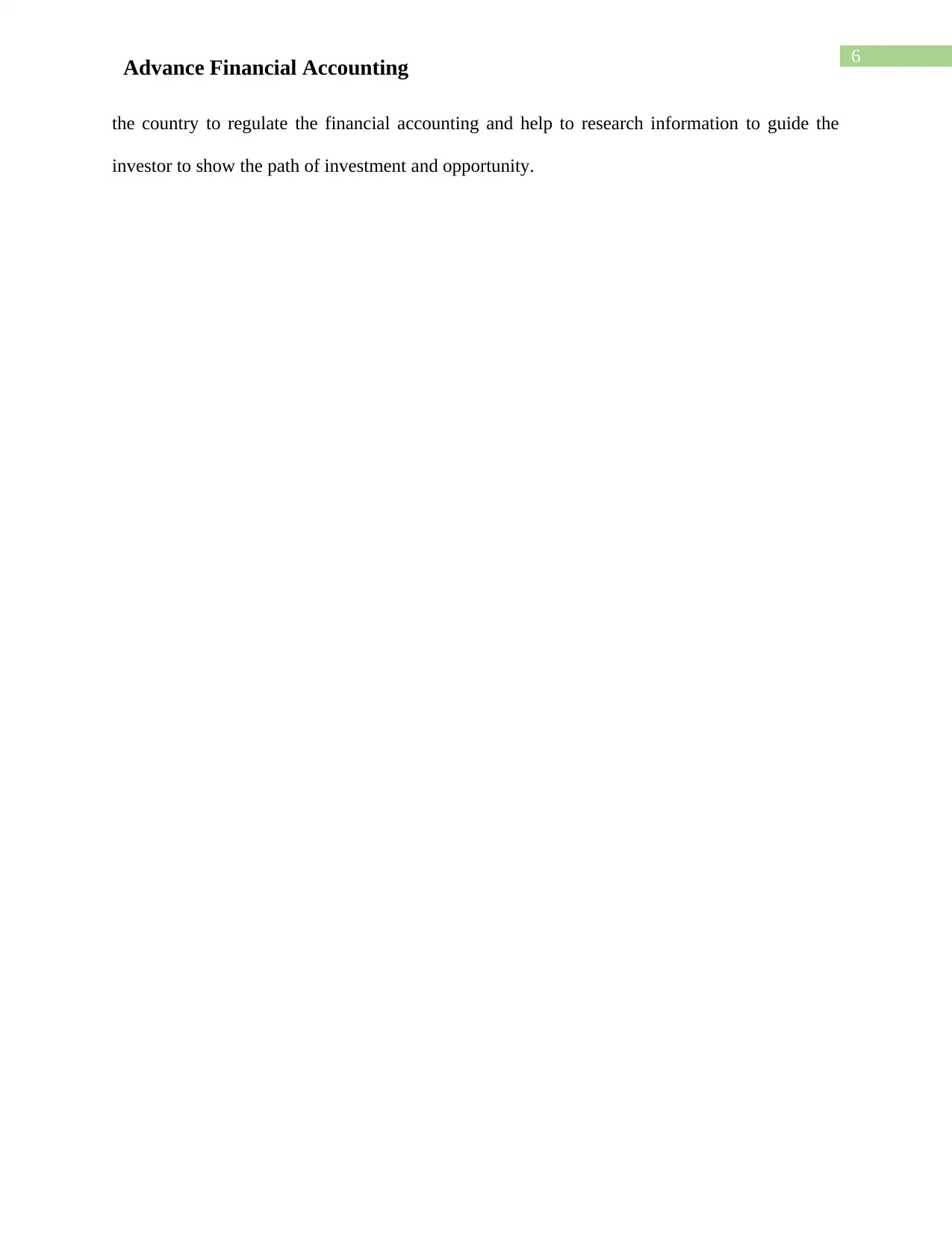
6
Advance Financial Accounting
the country to regulate the financial accounting and help to research information to guide the
investor to show the path of investment and opportunity.
Advance Financial Accounting
the country to regulate the financial accounting and help to research information to guide the
investor to show the path of investment and opportunity.
Paraphrase This Document
Need a fresh take? Get an instant paraphrase of this document with our AI Paraphraser
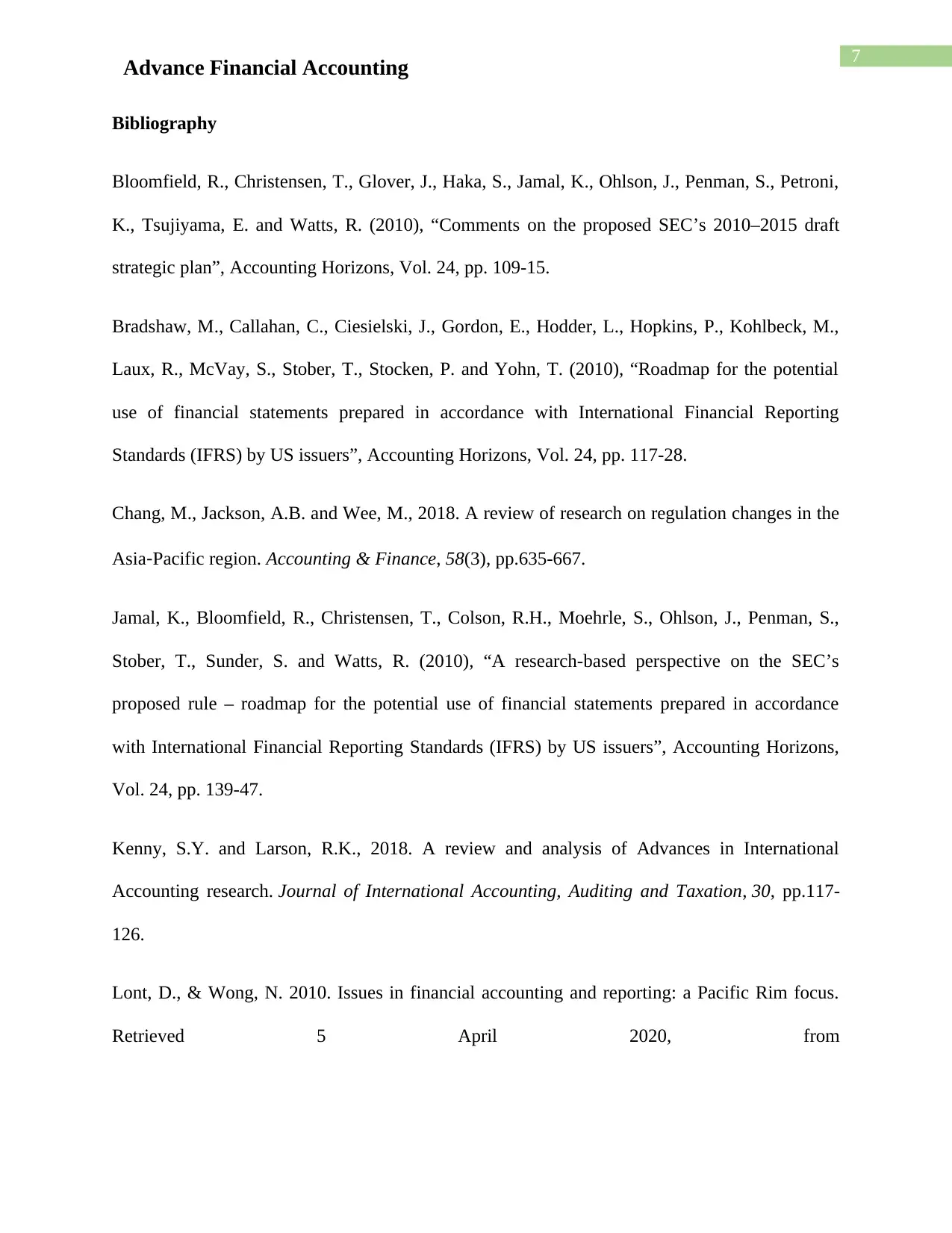
7
Advance Financial Accounting
Bibliography
Bloomfield, R., Christensen, T., Glover, J., Haka, S., Jamal, K., Ohlson, J., Penman, S., Petroni,
K., Tsujiyama, E. and Watts, R. (2010), “Comments on the proposed SEC’s 2010–2015 draft
strategic plan”, Accounting Horizons, Vol. 24, pp. 109-15.
Bradshaw, M., Callahan, C., Ciesielski, J., Gordon, E., Hodder, L., Hopkins, P., Kohlbeck, M.,
Laux, R., McVay, S., Stober, T., Stocken, P. and Yohn, T. (2010), “Roadmap for the potential
use of financial statements prepared in accordance with International Financial Reporting
Standards (IFRS) by US issuers”, Accounting Horizons, Vol. 24, pp. 117-28.
Chang, M., Jackson, A.B. and Wee, M., 2018. A review of research on regulation changes in the
Asia‐Pacific region. Accounting & Finance, 58(3), pp.635-667.
Jamal, K., Bloomfield, R., Christensen, T., Colson, R.H., Moehrle, S., Ohlson, J., Penman, S.,
Stober, T., Sunder, S. and Watts, R. (2010), “A research-based perspective on the SEC’s
proposed rule – roadmap for the potential use of financial statements prepared in accordance
with International Financial Reporting Standards (IFRS) by US issuers”, Accounting Horizons,
Vol. 24, pp. 139-47.
Kenny, S.Y. and Larson, R.K., 2018. A review and analysis of Advances in International
Accounting research. Journal of International Accounting, Auditing and Taxation, 30, pp.117-
126.
Lont, D., & Wong, N. 2010. Issues in financial accounting and reporting: a Pacific Rim focus.
Retrieved 5 April 2020, from
Advance Financial Accounting
Bibliography
Bloomfield, R., Christensen, T., Glover, J., Haka, S., Jamal, K., Ohlson, J., Penman, S., Petroni,
K., Tsujiyama, E. and Watts, R. (2010), “Comments on the proposed SEC’s 2010–2015 draft
strategic plan”, Accounting Horizons, Vol. 24, pp. 109-15.
Bradshaw, M., Callahan, C., Ciesielski, J., Gordon, E., Hodder, L., Hopkins, P., Kohlbeck, M.,
Laux, R., McVay, S., Stober, T., Stocken, P. and Yohn, T. (2010), “Roadmap for the potential
use of financial statements prepared in accordance with International Financial Reporting
Standards (IFRS) by US issuers”, Accounting Horizons, Vol. 24, pp. 117-28.
Chang, M., Jackson, A.B. and Wee, M., 2018. A review of research on regulation changes in the
Asia‐Pacific region. Accounting & Finance, 58(3), pp.635-667.
Jamal, K., Bloomfield, R., Christensen, T., Colson, R.H., Moehrle, S., Ohlson, J., Penman, S.,
Stober, T., Sunder, S. and Watts, R. (2010), “A research-based perspective on the SEC’s
proposed rule – roadmap for the potential use of financial statements prepared in accordance
with International Financial Reporting Standards (IFRS) by US issuers”, Accounting Horizons,
Vol. 24, pp. 139-47.
Kenny, S.Y. and Larson, R.K., 2018. A review and analysis of Advances in International
Accounting research. Journal of International Accounting, Auditing and Taxation, 30, pp.117-
126.
Lont, D., & Wong, N. 2010. Issues in financial accounting and reporting: a Pacific Rim focus.
Retrieved 5 April 2020, from
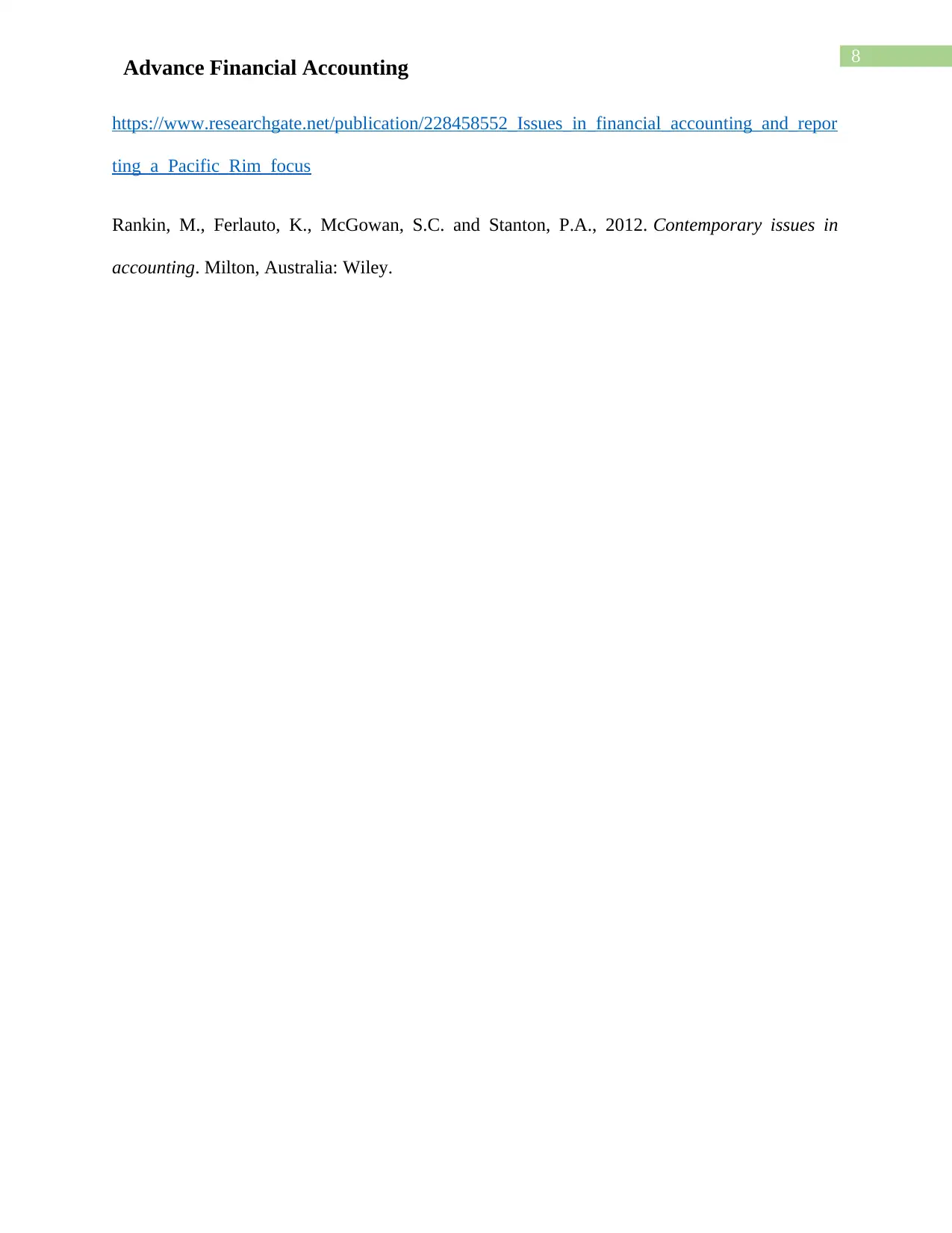
8
Advance Financial Accounting
https://www.researchgate.net/publication/228458552_Issues_in_financial_accounting_and_repor
ting_a_Pacific_Rim_focus
Rankin, M., Ferlauto, K., McGowan, S.C. and Stanton, P.A., 2012. Contemporary issues in
accounting. Milton, Australia: Wiley.
Advance Financial Accounting
https://www.researchgate.net/publication/228458552_Issues_in_financial_accounting_and_repor
ting_a_Pacific_Rim_focus
Rankin, M., Ferlauto, K., McGowan, S.C. and Stanton, P.A., 2012. Contemporary issues in
accounting. Milton, Australia: Wiley.
⊘ This is a preview!⊘
Do you want full access?
Subscribe today to unlock all pages.

Trusted by 1+ million students worldwide
1 out of 9
Related Documents
Your All-in-One AI-Powered Toolkit for Academic Success.
+13062052269
info@desklib.com
Available 24*7 on WhatsApp / Email
![[object Object]](/_next/static/media/star-bottom.7253800d.svg)
Unlock your academic potential
Copyright © 2020–2025 A2Z Services. All Rights Reserved. Developed and managed by ZUCOL.





